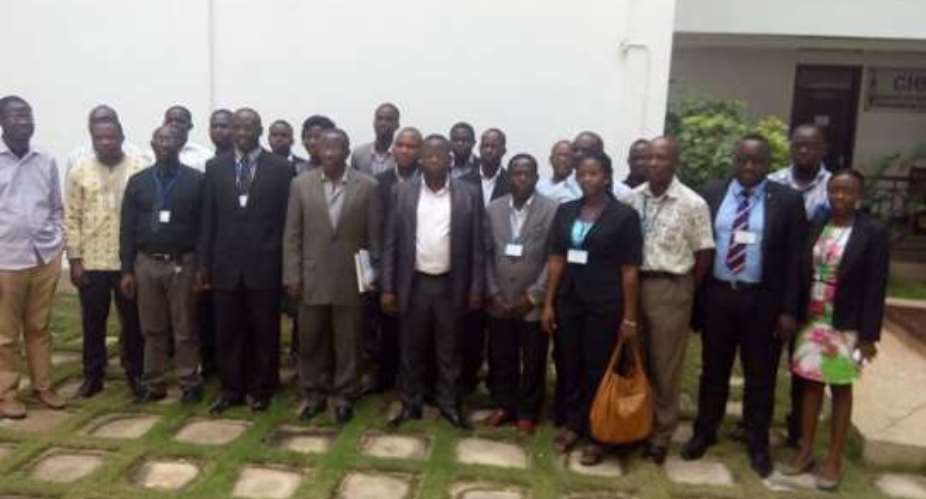By D.I. Laary, GNA
Accra, April 11, GNA - A study into Private-Public Partnerships (PPP) operations in Ghana's agriculture and environment sectors has shown mixed results.
The five-month research conducted on behalf of the United Nations University's Institute for Natural Resources in Africa (UNU-INRA) from November 2015 to March 2016 assessed PPP initiatives, formal partnership between the public and private sectors, funding, agreements and sharing of resources as well as tasks and risks involved in their operations.
The findings showed that lack of tax incentives, inadequate government engagement with stakeholders to address their needs, soaring inflation, and poor access to market, government bureaucracy and corruption are some adverse factors that militate against PPP effective operations.
However, the findings also indicated that PPP interventions led to increased employment and a raise in household incomes, while nutritious food activities were observed in terms of availability, accessibility and utilisation.
'There was a significant difference between the means of the variables measuring the level of technological innovation in the PPPs, technological improvements have also been confirmed by the beneficiaries' community members,' the researchers said.
'For example, the use of mobile phones has increased in some of the communities, a prototype storage facility has been introduced in one of the PPPs, and adoption of waste collection bins has increased in one of the environmental PPPs,' they added.
Speaking at a national dissemination workshop on the findings, Dr Richard Bonsi, a Consultant and Bonstech Sustainability and Management Expert, said the results revealed both favourable and unfavourable conditions.
Drawing from the mixed outcome of the research, he said improving upon PPP activities in the agriculture domain was imperative to accelerate the sector's growth for improved prosperity and livelihoods while safeguarding the environment.
He said the private sector should be encouraged to get involved in the activities of the agricultural sector and the environment to enhance food security, raise household incomes and fight malnutrition and poverty.
Dr Calvin Atewamba, UNU-INRA Green Economy Fellow, noted that there are a lot of challenges confronting the agriculture sector in the country and urged both private and public sectors to pump more money to overcome impediments that undermine the sector's growth.
'There are a lot of challenges in agriculture - lack of access to land, finance, post-harvest losses, and so on, to overcome these challenges we need new investment, new way of doing things,' he said.
He noted that PPP presents a huge benefit for the society as it would help generate income, improve revenue efficiency, introduce new technology and improve food security, but added there is a knowledge gap that ought to be addressed.
The meeting sought to brainstorm ways of bridging the knowledge gap in PPP and provide policymakers, researchers and business decision makers on how the partnership works in the agriculture and environment.
There were plenary sessions that covered presentations and discussions on socio-political and economic factors and levels of fragility that influence the development of PPPs and country landscapes, including their PPP's contractual frameworks and financial models.
Also, PPPs process and management operations and their key challenges and opportunities in maintaining the partnership as well as performance and development outcomes of PPPs, including their contribution to inclusive and sustainable growth also featured in the sessions.
GNA





 Former Kotoko Player George Asare elected SRC President at PUG Law Faculty
Former Kotoko Player George Asare elected SRC President at PUG Law Faculty
 2024 elections: Consider ‘dumsor’ when casting your votes; NPP deserves less — P...
2024 elections: Consider ‘dumsor’ when casting your votes; NPP deserves less — P...
 You have no grounds to call Mahama incompetent; you’ve failed — Prof. Marfo blas...
You have no grounds to call Mahama incompetent; you’ve failed — Prof. Marfo blas...
 2024 elections: NPP creates better policies for people like us; we’ll vote for B...
2024 elections: NPP creates better policies for people like us; we’ll vote for B...
 Don’t exchange your life for wealth; a sparkle of fire can be your end — Gender ...
Don’t exchange your life for wealth; a sparkle of fire can be your end — Gender ...
 Ghana’s newly installed Poland train reportedly involved in accident while on a ...
Ghana’s newly installed Poland train reportedly involved in accident while on a ...
 Chieftaincy disputes: Government imposes 4pm to 7am curfew on Sampa township
Chieftaincy disputes: Government imposes 4pm to 7am curfew on Sampa township
 Franklin Cudjoe fumes at unaccountable wasteful executive living large at the ex...
Franklin Cudjoe fumes at unaccountable wasteful executive living large at the ex...
 I'll 'stoop too low' for votes; I'm never moved by your propaganda — Oquaye Jnr ...
I'll 'stoop too low' for votes; I'm never moved by your propaganda — Oquaye Jnr ...
 Kumasi Thermal Plant commissioning: I pray God opens the eyes of leaders who don...
Kumasi Thermal Plant commissioning: I pray God opens the eyes of leaders who don...
